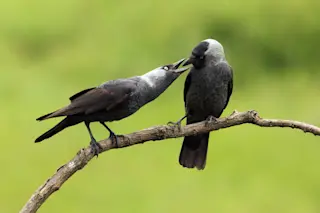Stories of monogamous animals have a way of melting human hearts. You may have heard about lifelong swan partners, or watched the documentary March of the Penguins and shed some tears over the committed parents risking it all for their yet-to-hatch chicks. But monogamy in the animal kingdom is more circumstantial, complicated and often promiscuous than the standards we have for ourselves.
For starters, there are several different types of monogamy found among species in the wild. Sometimes couples can be temporary, or the environment might influence an animal’s drive to pair up. Ongoing research is also revealing that some pairs aren't as exclusive as we once thought.
When animal researchers use the term social monogamy, “it doesn’t require fidelity,” says Rebecca Young, an evolutionary biologist at the University of Texas at Austin. It typically refers to a pair bond between two animals that are defending resources, such as shelter ...














